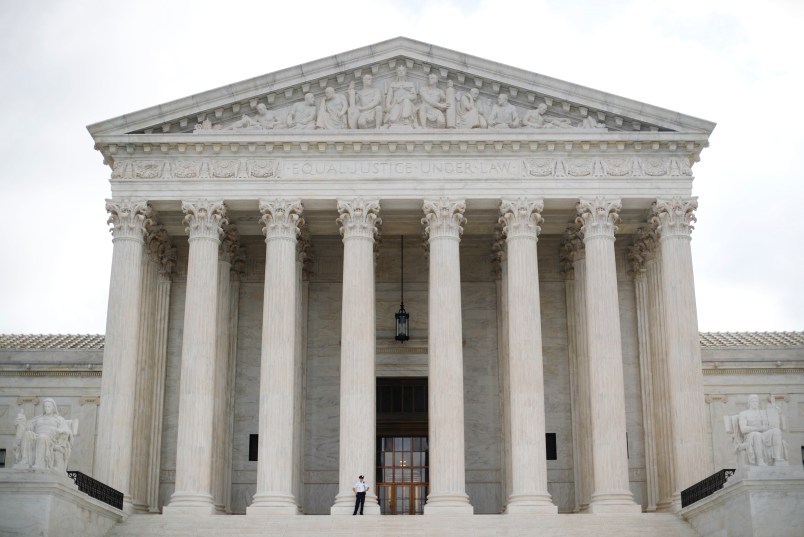An unknown company owned by a foreign government can proceed in filing a sealed request to ask the Supreme Court to consider its appeal of a Robert Mueller-linked grand jury subpoena, the court announced Tuesday.
A redacted version of the request has been made available to the public.
The move will allow the unnamed firm – reportedly a financial institution – a chance at winning an appeal before the Supreme Court.
The mysterious company was ordered to file redacted versions of its court papers for the public record.
Little is known about the company in the case in question. A contempt order issued by a lower court that SCOTUS declined to block is forcing the firm to pay a fine of $50,000 per day as long as it refuses to comply with the grand jury subpoena. Today’s redacted filing confirms that the company is “wholly owned” by a foreign state, meaning that it would have no other shareholders.
CNN reported on Jan. 9 that the firm is represented by the law firm Alston & Bird.
In the redacted petition for writ of certiorari – a motion for the Supreme Court to hear its appeal – the mystery company argues that the D.C. circuit court is “the first appellate court in American history to exercise criminal jurisdiction over a foreign state.”
The company contends that the appellate-level ruling “would wreak havoc on American foreign policy—possibly alienating U.S. allies, undermining diplomatic efforts, and inviting reciprocal treatment abroad for American agencies and instrumentalities.”
Politico first reported the case in October after noticing links to the Mueller investigation, fueling speculation about the nature of the company and the subpoena it was attempting to quash. The D.C. circuit court agreed with a district-level decision that the subpoena could be served on the company, regardless of its foreign government ownership, due to an exception in the Foreign Sovereign Immunities Act.
The D.C. Circuit did not specify that the grand jury subpoena was issued by the special counsel. The recusal of a Trump-appointed judge early in the case, as well as special counsel attorneys observed to be in the vicinity of the D.C. courthouse on the days of hearings in the case, point to a Mueller link in the case.
Supreme Court Chief Justice John Roberts temporarily halted a lower court’s decision to hold the company in contempt and impose fines for its refusal to comply with the subpoena on Dec. 23, before declining to block the monetary penalties.
The unknown firm goes on to envision a “foreign-policy nightmare” that would occur if U.S. courts “started enmeshing foreign states in domestic criminal proceedings.” The company also makes an argument of reciprocity, telling the justices that lower courts in the case “have denied Country A the sovereign immunity that the United States enjoys abroad.”
“Few things would offend sovereign dignity more than subjecting the sovereign to another country’s criminal process, which is why the international community (including the United States) has long immunized foreign states and their leaders from domestic criminal jurisdiction,” the company adds.
The company makes a rhetorical shift in the filing, arguing that since it falls within the Foreign Sovereign Immunities Act’s “definition of a ‘foreign state,’ the “U.S. Government served a grand jury subpoena on Country A.” The filing goes on to state that “Country A understands that it is a witness in the investigation.”
The argument then goes to whether or not foreign sovereigns are immune in criminal cases, and whether an exemption for commercial activity applies in the case.
The firm goes on to call the D.C. circuit court’s ruling “an unusual move no doubt spurred by concerns about the time constraints on the Government’s investigation.”
The firm goes on to maintain that “it was not for the D.C. Circuit to second-guess Congress’s policy choice,” and that “absolute immunity from criminal jurisdiction was and is the rule in America and abroad.”
Should that absolute immunity be broken, the company adds, it could “expose American agencies and instrumentalities to criminal proceedings abroad.”
The firm goes on to maintain that “it was not for the D.C. Circuit to second-guess Congress’s policy choice,” and that “absolute immunity from criminal jurisdiction was and is the rule in America and abroad.”
Should that absolute immunity be broken, the company adds, it could “expose American agencies and instrumentalities to criminal proceedings abroad.”
“The D.C. circuit’s parade of horribles finds no support in U.S. history,” the company adds. “Since America’s founding, foreign states have been immune from American criminal jurisdiction, and yet the United States is not overrun with criminal syndicates backed by foreign states.”
The company returns to its reciprocity argument, citing a case in which the Russian government was fined $50,000 per day for “not complying with a court order.” The firm reminds the court that “reciprocity concerns fueled Congress’s policy choices” and that “Russia reciprocated by suing the United States and levying $50,000-per-day in sanctions against the American government.”
The company concludes by arguing that the D.C. circuit’s ruling should be reversed “before it upsets foreign relations in a way that an American judicial decision never should.”
Read a redacted version of the company’s petition below:







Hmm… hope they don’t do something stupid. Lower court ruling was very emphatic.
It’ll give us a pretty good read of exactly how willing the newbies are to sell their souls to Spankee.
I LIKE BEER, THEY LIKE BEER! will be part and parcel of final ruling
When your “authorities” include an almost entirely unrelated Wall Street Journal article, your argument may not be of the highest quality.
I wonder whether the opinion siding with the perps will be redacted too.
PLEASE let it be Deutsche Bank!